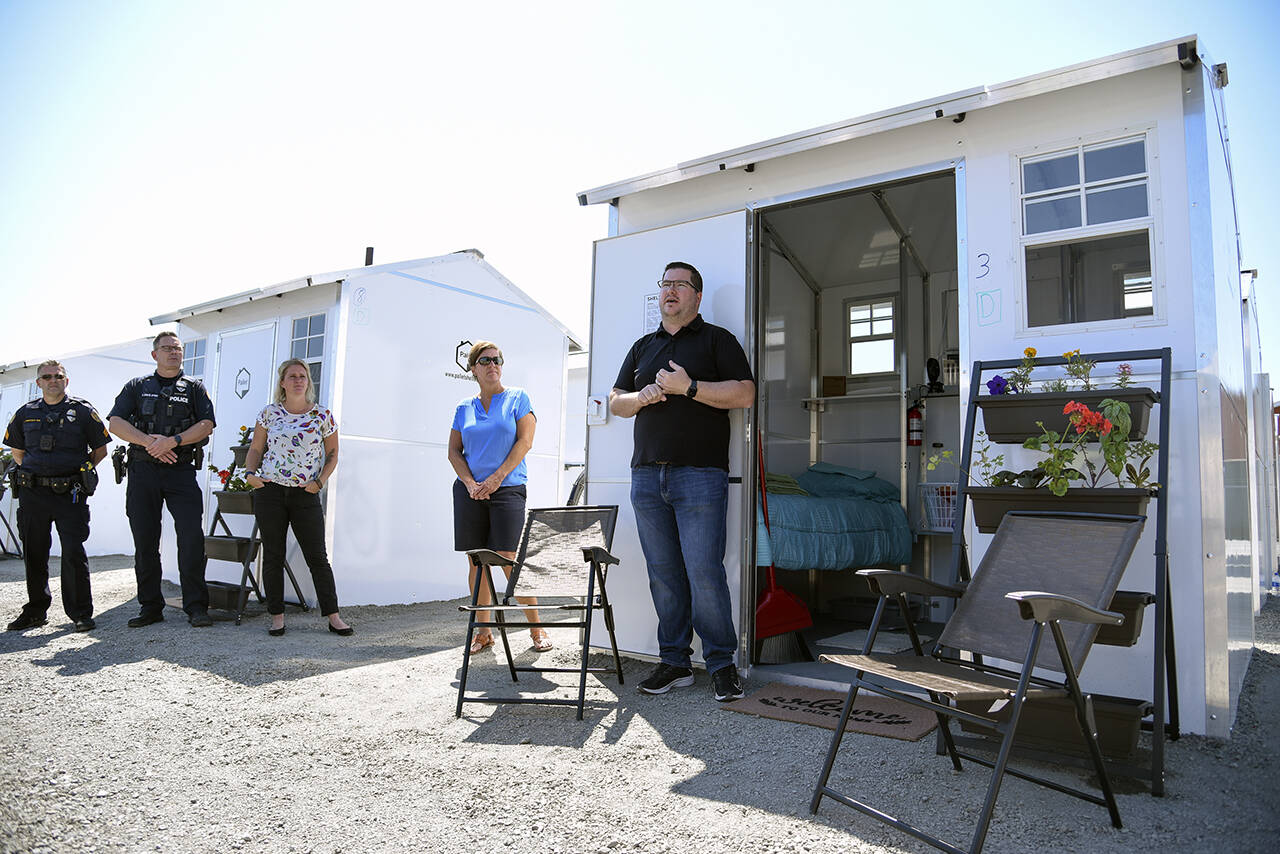By The Herald Editorial Board
As the Edmonds City Council continues crafting what it calls an “anti-camping” ordinance that would bar homeless people — estimated at some 450 Edmonds residents — from occupying and storing property overnight on public spaces, its council members need to consider — as the Everett City Council did a year ago — not only the tools available to the city, but the order in which those tools are used.
The Edmonds Council in recent weeks has struggled with drafting the ordinance, which would cite those who violate the ordinance with a misdemeanor, punishable by a fine up to $1,000 or up to 90 days in jail if an offer of available shelter is refused. Council members discussed several amendments last Thursday and have continued the matter to its May 17 meeting.
Certainly, additional tweaks and amendments can be considered, starting with a less extreme punishment for violations. Even assuming a judge’s discretion, the proposed ordinance’s high end of $1,000 fine or 90 days in jail is simply ludicrous when considering the poverty that almost all who are suffering homelessness live with. Adding to that burden with a heavy fine — or the threat of jail — comes off more as a scare tactic against homeless individuals than a useful tool for addressing homelessness.
An amendment proposed by the council’s Laura Johnson, which would have dropped the fine to $25, lost on a 5-2 vote, noted The Herald’s Isabella Breda. Reconsideration of the fine would be a first step for the council.
And as far as “camping” goes, a tweet by a state civil rights organization — the Resident Action Project — is correct that “camping” is what housed people do “and usually involves a campfire, s’mores and a serene setting.”
“Unhoused people are not ‘camping,’” the group’s tweet continued. “They are trying to survive another night without comfort, protection, safety, privacy and dignity!”
But amendments to the ordinance might not address the overarching flaw with the ordinance: that those liable for a citation would first have to refuse available shelter, a point that Edmonds Police Chief Michelle Bennett attempted to impress upon the council: “The only time it would become illegal or the only time it would become arrestable would be if … we tell the person we have the services, they say, ‘No I don’t want them.’”
Because Edmonds — currently — can make no reasonable offer of shelter to those it might seek to cite for sleeping overnight on city streets, its beaches or parks. Within Edmonds’ city limits, there is no available shelter. The closet shelter — one reserved for women and children — is in Lynnwood and run by the YWCA and currently has a wait list of at least 60 days. Of eight shelters in Snohomish County offering temporary housing, most are in Everett.
And an amendment — which did pass unanimously — attempting to stretch the definition of “available shelter” as being within a 35-mile radius of Edmonds City Hall offers the city the flimsiest of shelters from a potential legal challenge. That radius would expect Everett, much of Snohomish County’s other cities and Seattle to accept the burden of Edmonds’ homeless population.
When the City of Boise attempted a similar ordinance, it was forced to settle a lawsuit for $1.8 million, after a court determined that Boise could not criminalize sleeping in public when no other shelter was available. But the same court allowed that such ordinances might be found constitutional if they are limited to specific times or areas.
Everett’s ordinance applies to a limited zone, centered on the Everett Gospel Mission, east of Broadway, between Pacific Avenue and 41st Street. Edmonds’ proposed ordinance, instead, relies on a time limit; yet Edmonds’ inability to offer its own shelter could leave the city open to legal challenges if it attempts to enforce the ordinance.
The Everett City Council, when it passed its “no-sit, no lie” ordinance in March 2021, delayed its enforcement until that July when it opened a 21-unit compound of pallet shelters — small, one-room shelters with heat and electricity with services available to residents — on city property near the mission. Everett has used some of its American Rescue Plan Act funding to add another 20 shelters at the facility and is looking to place more at a second location in the city.
Edmonds’ Homelessness Task Force reportedly recommended the anti-camping ordinance among a list of recommendations, but the task force also has strongly urged the city to first create more shelter opportunities within the city. Such an ordinance might find use as a carrot-and-stick approach to encouraging people to take advantage of shelter opportunities and other services, but the ordinance is useless — and unenforceable — if there is no available shelter.
Everett, like many other cities to be sure, continues to struggle to adequately meeting the needs of its homeless population as well as the concerns of all residents for related issues, but it has made far more than token efforts to address those issues. And it has not expected its neighbors to find shelter for its own homeless residents.
Correction: An earlier version of this editorial misidentified the Edmonds City Council member who sought to change the proposed ordinance’s fine to $25. Council member Laura Johnson made the motion.
Talk to us
> Give us your news tips.
> Send us a letter to the editor.
> More Herald contact information.

























